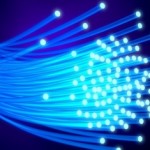- This topic has 19 replies, 5 voices, and was last updated 10 years, 2 months ago by
 alistu.
alistu.
-
AuthorPosts
-
-
August 10, 2015 at 11:59 pm #23396
 HagerParticipant
HagerParticipantDPSK is one of ROF modulation techniques,in this simulation at Tx the data are used to modulate three different carrier having frequencies 10,15,20 GHZ ,bandwidth= 1.5*Bit Rate which Bit Rate varying (0.5,1,1.5,2)GHZ These signals are
then combined using electrical power combiner and this combined signal is used to modulate an optical carrier of
frequency 193.1 THz using mach zehnder modulator (MZM), transmitted through the single mode fiber length varing (10,20,30,40 KM)
at RX These optical signals are then passed through optical band pass filters (frequencies 193.110 THz, 193.115 THz, 193.120)
in my simulation i used opti system 13 , Bit Rate 2 GHZ, length of SMF is 40 KM.
I modified it by using VCSEL instead of CW Laser , EDFA instead of optical amplifier and one user only for bit rate=10GHZ , varing distance from 10 km to 120 km but I found degradation results in BER analyzer, plz modify it for me -
August 11, 2015 at 12:02 am #23398
 HagerParticipant
HagerParticipantThis is new simulation after modifying it.
-
August 11, 2015 at 1:21 am #23406
 alistuParticipant
alistuParticipantHi Hager, I read your post but I don’t have access to Optisystem right now. However, I will simulate the file as soon as I get access to the software. By the way, I think it is normal that by increasing the distance you get worse results than before, and this is what is happening in your case. So I don’t see anything strange in that.
-
-
August 11, 2015 at 12:03 am #23400
 HagerParticipant
HagerParticipantthe paper
-
August 11, 2015 at 1:28 am #23407
 alistuParticipant
alistuParticipantIn this paper I only see the simulations being done for the fiber length of at 40 kilometers at the most, whereas you have done the simulation for the length of 120+5 kilometers. So I think you should expect the degradation in the results due to the increase in destructive effects of the fiber such as dispersion.
-
-
August 11, 2015 at 12:07 am #23402
 HagerParticipant
HagerParticipantthis is screen shot of my results after modification ,there is an a problem of degradation of results of BER analyzer
-
August 11, 2015 at 3:18 am #23413
 alistuParticipant
alistuParticipantHi hager, I simulated your file and got the results above. I think the reason for this degradation is the increase in the fiber length in comparison to the lengths simulated in the paper you referred to. When you increase fiber length, the dispersion effect contributes more to the system degradation. I suggest using DCF.
-
-
August 11, 2015 at 5:23 am #23424
 alistuParticipant
alistuParticipantI also think there might be some other factor that might (and just might) be making problem in your system. In the paper, optical amplifiers have been used with an amlification of more than the loss of the fiber. But here you have used EDFA. Have you calculated in any way if EDFA provides enough amplification?
-
November 12, 2015 at 7:37 am #27679
Tayyab Mehmood
ParticipantAfter reading the whole topic on Radio over fiber system, I concluded that I have the same problem with my system. Although my system is a bit more simple than the above mentioned system was but I am not getting the desired results (BER=10^-12). currently the BER is 0.
system specifications: bit rate= 240 Mbps ; symbol rate= 120 Msps; bits per symbol= 2 bits;
frequency of first DPSK modulator is 0.7 GHz; frequency of second DPSK modulator is 1.5 GHz.
I am attaching the snapshot and the system file below.
Regards-
November 12, 2015 at 8:14 am #27682
 alistuParticipant
alistuParticipantHi Tayyab,
The more the Q-factor, the less the error. When Q-factor is about 9, The BER is less than 10e-12, while the Q-factor in your system is abut 175!! which shows your system is doing absolutely fine. You can even increase the bit rate and/or length of the transmission line to acquire a specific Q-factor and BER. So there’s nothing wrong with your system in this regard.
Regards
-
November 12, 2015 at 10:20 pm #27695
 Dr. Dhiman KakatiParticipant
Dr. Dhiman KakatiParticipantHi Tayyab, the system design you have uploaded is only for 240 Mbit/s for each PRBS generator. which is very less and if we increase the bit rate the system output becomes very noisy.
Regards
-
-
November 12, 2015 at 10:12 pm #27694
 Prarthana KashyapParticipant
Prarthana KashyapParticipantHi Alistu, Do you have any suggestion for the wireless portion, please suggest me I want to know about this.
Thank you..-
November 13, 2015 at 3:08 am #27697
 alistuParticipant
alistuParticipantHi Prarthana,
If you have designed a system and it is not working fine due to some problem in implementation, you can upload the file here so that I would be able to check it and make the suggestions. Otherwise, if you want better system performance, you can do plenty of things like increasing the launched power or using fiber amplifiers and so on.
Regards
-
-
November 13, 2015 at 6:57 am #27703
Tayyab Mehmood
ParticipantThanks Dhiman and Alistu for replying,
now I increase the bit rate from 240-Mb/s to 24 Gb/s, increase the length of SMF from 5Km to 100 Km and decreases the input power of the laser from 0d dBm to -5 dBm.
Still the BER is zero and now the Q-factor is in thousands.
I think there is a problem with the configured parameters or I am using wrong components for the system.
Kindly help me in this matter.Regards
-
November 13, 2015 at 6:58 am #27704
Tayyab Mehmood
Participanthere are the files
-
November 13, 2015 at 7:57 am #27711
 Dr. Dhiman KakatiParticipant
Dr. Dhiman KakatiParticipantYou are Most Welcome Tayab, The BER=0 in not at all a problem, it means your design is an efficient one.
I have run your system and found that the BER becomes 1 when the fiber length is 0 km, and it decreases when I increase the fiber length for example 100 km and found around 1000 Q factor, and even 1600 for 200 km which is the reverse case. i.e. theoretically when we increase fiber length the Q factor should decrease because of fiber attenuation and dispersion, so there must be some mistake I am looking into the circuit, hope to get solved the problem. Thanks
Regards
-
-
November 13, 2015 at 11:36 am #27715
 alistuParticipant
alistuParticipantHi Tayyab,
I realized that the fiber you have been using in the simulation has not included some important physical effects that degrade the signal, such as dispersion and some nonlinearities. This might make the system give better yet unreliable results. Even though cvhanging this also did not make much difference, but you may want to consider this.
Regards
-
November 13, 2015 at 12:25 pm #27717
Tayyab Mehmood
ParticipantThanks Alistu and Dhiman for replying.
Regards
-
November 16, 2015 at 1:39 am #27752
Tayyab Mehmood
ParticipantI post my problem in this thread because Hager had the same problem in the beginning of this thread.
I still did not figure it out whats wrong with the DPSK system.Regards
-
November 16, 2015 at 3:04 am #27763
 alistuParticipant
alistuParticipantI think your problem is somehow different from that of Hager’s. In Hager’s case, the BER had values other than 0 or 1, while in your case it is not so. And unfortunately, we do not have access to the simulation files anymore, as they have all been detached. However, his was due to long fiber link, while in your case, I managed to do the simulation for 7000km without any errors!
-
-
-
AuthorPosts
- You must be logged in to reply to this topic.

